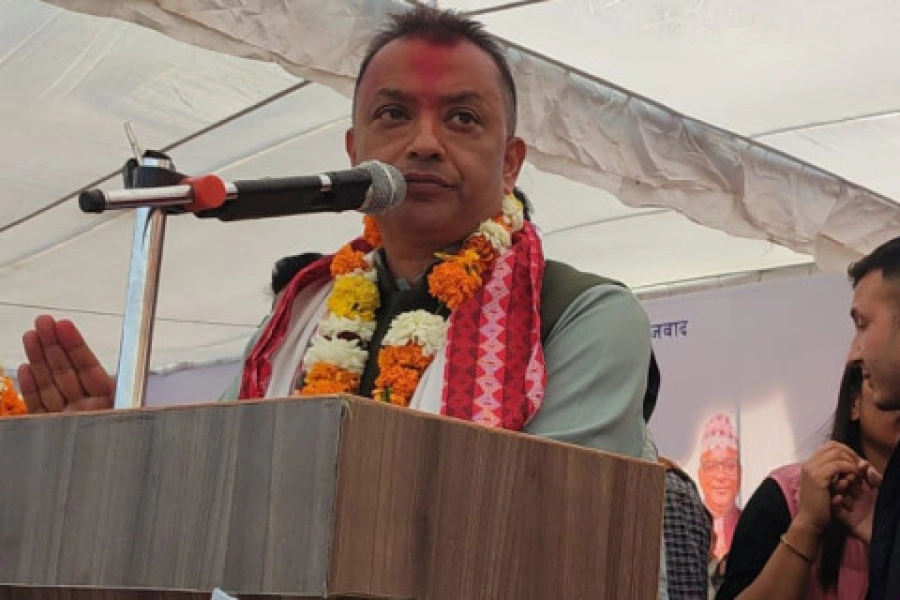Inmates at the central jailweave and spin
At the central jail in Sundhara, Kathmandu, there are around 2,750 prisoners. Out of them, 150 work at the textile factory located within the premises. The ‘Kendriya Karagar Karkhana’ (Central Jail Factory) is where they work from 10 in the morning to four in the afternoon for a meager daily stipend. This is from where most fabric items like bedsheets, towels, tablecloths, handkerchiefs and the likes are supplied to various government institutions, hospitals, and the Nepal Airlines Corporation.
“Along with a daily wage, the inmates get 20 percent off of their jail sentences for each year they work at the factory,” says Ram Hari Dhungel, chief of office, adding that usually inmates with jail sentences of more than 10 years are the ones who are encouraged to come and work at the factory.
The central jail factory was established in 1960 when Bishweshwar Prasad Koirala was the prime minister of Nepal. Under the supervision of the home ministry and the ministry of industry, half of the then jail premises was allotted for the factory setup. The central jail in Sundhara is, even today, the only jail with a fully functional factory inside it.
According to Dhungel, chief of office, who has been working at the factory for almost two decades, the factory’s initial budget was Rs 12,000, which the factory used to buy cotton threads to make bed covers. Dhungel says that even today the only fabric used at the factory is cotton.
Night clubs and dance bars in Kathmandu becoming crime hubs

The factory houses 74 machines, ranging from looms and fabric seaming machines to knitting and winding machines as well as dyeing machines. The 150 workers are divided into different sections like the weaving section, fabric spinning section, and the dyeing section.
To be up to these tasks, the factory gives training to inmates, who are chosen and sent by the central jail, on textile production before employing them. Along with the inmates, there are 21 different posts for government officials at the factory. However, the factory is severely short staffed as only four government officials are currently working there.
“People are often skeptical about working inside a jail. They don’t want their family and acquaintances to find out that they work for the central jail,” says Dhungel adding that this has resulted in slow workings of the factory as there are only few people to manage all the logistics.
A central mobilization fund has been set up for the factory and that is what’s used to buy cotton threads and dyes, repair machines, pay the workers as well as purchase other materials needed to make the products. “The fund is self-sustainable. Every year, raw materials are bought by the earnings of the previous year,” explains Dhungel adding that the products made at the factory are available to individual buyers as well as business and corporate houses.
“The rates are low and there is a discount of 10 percent on that as well,” he says explaining that the prices at which the products are sold are determined by a special committee comprising of factory officials, and from the department of industry as well as the central jail. Dhungel reveals that in the previous year the factory made a total sale of Rs 7.6 million.
However, Dhungel laments that not all government offices are willing to purchase the fabrics made at the factory. He claims they have ulterior motives in not doing so and says it’s one of the reasons why the demand for products is sometimes low and the inmates don’t get enough work. He wishes the government would encourage all its offices to buy fabrics from the central jail so that the investment it has made doesn’t go to waste and the inmates can make productive use of their time.
A reason for low retail sales, on the other hand, could be because of all the hassle one has to go through to buy the factory produced goods. Dhungel is quick to agree. He says that till a few years ago, they used to have quite a few buyers from various shops in Thamel but because of all the bureaucratic red tape, they have stopped coming altogether.
“To enter the jail premises, one has to get a gate permit, leave their phones and other belongings outside the gate every single time and go through rigorous checking. So it’s arduous to make frequent visits,” he explains.
To resolve this issue and try to revive business, this year, under the Ministry of Industry, Commerce and Supplies, the authorities at the central jail factory have decided to open a retail outlet outside the jail premises. This they hope will make their products easily accessible to the public. The said outlet will be within the premises of the department of industry at Tripureshwor in Kathmandu and will be in operation by the end of September this year.
A brand new two-story building was constructed for the outlet. The ground floor will act as storage whereas the first floor will house the main store where people can browse through a wide range of fabrics in different patterns and colors.
Dhungel hopes that the opening of the retail store will help the factory expand its reach. “It certainly is a move forward for the factory as a whole as well as for the inmates working here,” he says. The fact that their work is being showcased to the public in such a large scale will also act as a motivational boost for the workers whose contact with the outside world is almost non-existent, he adds.
However, he also thinks in order to compete in today’s market the inmates need to be provided skill development trainings on a regular basis. “They are skilled and they produce good quality materials. But they could be trained further to do better and make finer cloth,” he concludes.
acharyaurza8170@gmail.com






































